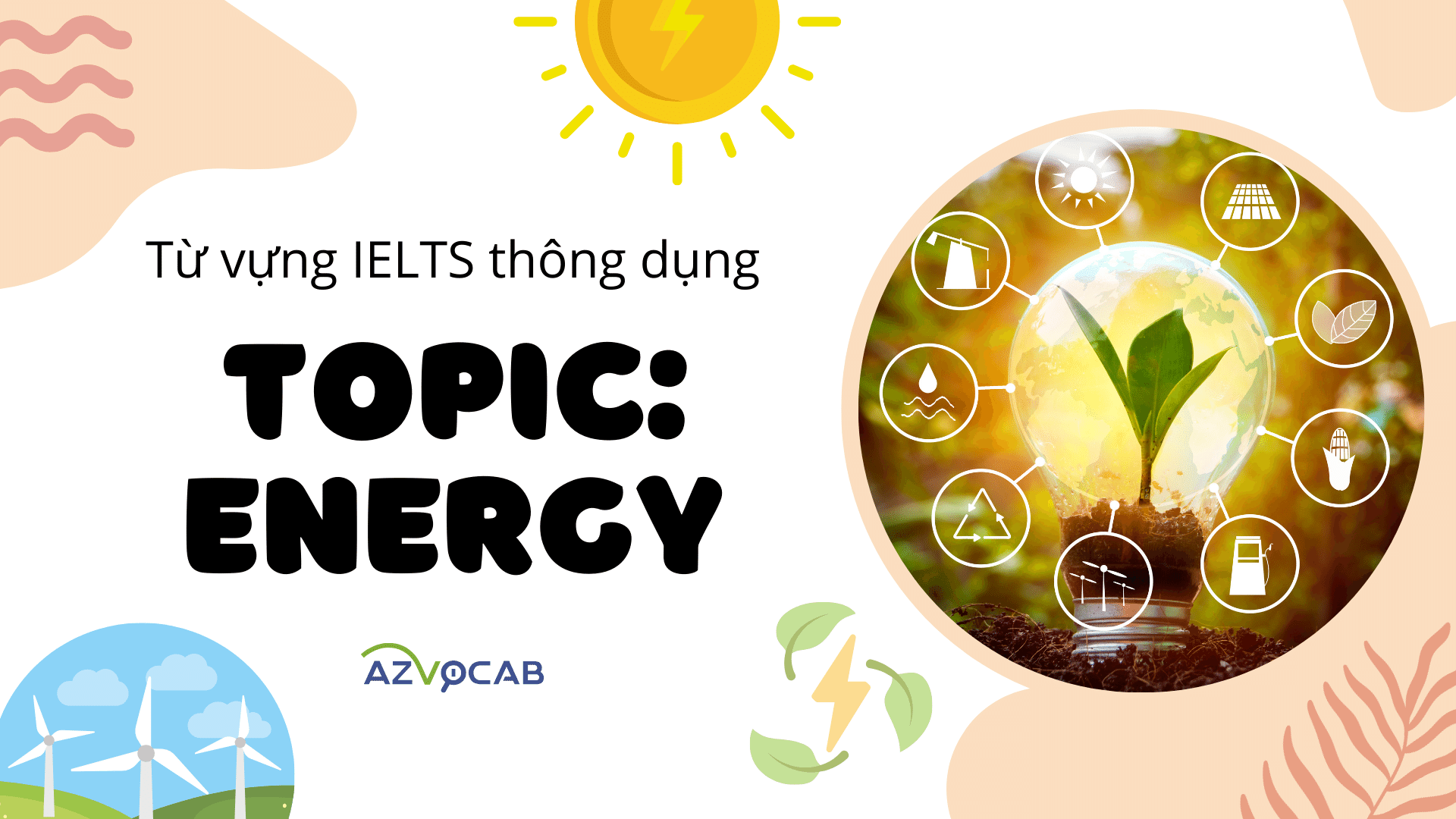Từ những bộ sách hay nhất cho việc ôn thi IELTS, azVocab đã tổng hợp được hơn 50 từ vựng phổ biến nhất thuộc chủ đề Energy cho kì thi IELTS.
Các từ vựng này đều có thể sử dụng cho cả 4 kỹ năng Reading, Listening, Speaking và Writing. Những ví dụ được azVocab lựa chọn kĩ lưỡng trong từng ngữ cảnh cụ thể ở các bài thi IELTS. Điều này sẽ giúp các bạn biết cách sử dụng từ trong ngữ cảnh, tăng tính hiệu quả của việc học từ.
1. Từ vựng về tài nguyên năng lượng
| biofuel (n.) – nhiên liệu sinh học | Others believe that biofuels are the future. |
| electricity (n.) – điện | If you own a four-wheel-drive car and replace it with a hybrid car – a car that is powered by a combination of electricity and petrol – or a smaller standard-fuel car, you can achieve a reduction of that magnitude in a day rather than half a century. |
| fossil fuel (n.) – nhiên liệu hóa thạch | At the moment we are far too dependent on fossil fuels to meet our energy needs. |
| hydrogen (n.) – khí hydro | Hydrogen is a cleaner, greener alternative to fossil fuels but it does not occur naturally – it has to be made. |
| petrol (n.) – xăng | The process they have developed creates the hydrogen gas which they claim is vital for our future as it provides a huge range of possibilities. Among many other things, it could be used instead of petrol to run our cars. |
| precious metal (n.) – kim loại quý | Of course, precious metals and precious stones are the natural resources that most people go in search of in the hope of striking it rich. |
| reservoir (n.) – hồ chứa | In a process similar to drilling for oil, wells as deep as a mile or more can be drilled into underground reservoirs to tap steam and hot water that are used to run turbines and create energy. |
| resource (n.) – tài nguyên | The advantages of ‘green energy’ are obvious. There is no need to worry about dwindling supplies of progressively more expensive resources. |
| resource (n.) – nguồn lực | Farmers are turning to genetically modified crops to try to boost productivity and grow crops in more ecologically healthy fields while allowing more efficient use of resources. |
| source (n.) – nguồn | Stricter emissions targets should be set and use of alternative sources of energy encouraged. |
| turbine (n.) – tua bin | Although there are emissions costs in the building of wind turbines or hydroelectric power stations, there is no future air pollution or the risk of environmental contamination. |
| wind farm (n.) – cánh đồng gió | I mean, one of the main criticisms of things like wind farms is how visible the wind turbines are. |
| alternative (adj.) – thay thế | Many countries are exploring alternative energy sources such as solar energy or wind power, which use large turbines to capture the energy of the wind. |
| electric (adj.) – dùng điện | I think everyone in my country is so aware of the impact we’re having on the environment that I think it is conceivable that we’ll have solved the problem soon. It’s quite feasible that we’ll all be driving electric cars. |
| nuclear (adj.) – (thuộc) hạt nhân | One last obstacle to the adoption of ‘green energy’ is nuclear power. |
| rechargeable (adj.) – có thể sạc lại | If it works, this black sludge will transform the rechargeable battery, doubling the range of electric cars and making petroleum obsolete. |
| renewable (adj.) – tái tạo được | Not only do fossil fuels pose an environmental hazard but there is also a pressing need to find an alternative energy source that is renewable. |
2. Từ vựng về sự sử dụng và tiêu thụ năng lượng
| carbon footprint (n.) – lượng carbon tạo ra | The four main areas that determine your carbon footprint are electricity usage, oil or natural gas usage, car mileage, and airplane trips. |
| carbon dioxide (n.) – khí CO2 | David Bayless, a professor of mechanical engineering at Ohio University, has been working with scientists to engineer a device that can grow cyanobacteria (blue-green algae). It uses carbon dioxide from the gases emitted from power-plant chimneys and sunlight that is distributed to the growing surfaces through optical fibres. |
| consumption (n.) – sự tiêu thụ | Energy consumption, congestion and pollution have increased. |
| hybrid (n.) – phương tiện hybrid (vừa chạy bằng xăng vừa chạy bằng điện) | Most car manufacturers now offer hybrids. |
| mining (n.) – sự khai mỏ | Mining in Australia probably started with the arrival of Aborigines around 40.000 years ago. |
| scale (n.) – quy mô | Of course, the generation of urban waste was not new in itself, but the scale of waste production after 1800 certainly was. |
| supply (n.) – nguồn cung | It is also a problem that replacing our current energy supply will entail expensive research and development, which, in turn, involves government cooperation. |
| tank (n.) – thùng, két, bể chứa | It is unlikely that drivers would ever want to fill up their tanks entirely with ethanol, which contains only two-thirds of the energy of gasoline, whereas biodiesel is only 2 percent less fuel-efficient than petroleum-based diesel. |
| vehicle (n.) – phương tiện giao thông | The local council imposed a new tax on vehicles travelling in the city during rush hour. |
| carbon neutral (adj.) – trung hòa carbon | The festival this year will be carbon neutral, meaning it will offset the carbon dioxide it emits by purchasing credits that pay for cleaning carbon waste. |
| critical (adj.) – quan trọng | CO2 plays a critical role in maintaining the balance in the Earth’s atmosphere and the air that we breathe. |
| efficient (adj.) – hiệu quả | People would use a lot less power if they bought household goods that were energy efficient. |
| pressing (adj.) – cấp bách | It is unlikely we will abandon our cars in large enough numbers to resolve this problem, so there is a pressing need to find an alternative fuel. |
| unleaded (adj.) – không chì | Samuel Bowser first invented the petrol pump in 1885 but it wasn’t until 1988 that all new cars manufactured in the UK were required to use unleaded petrol only. |
| useless (adj.) – vô dụng | Without fuel, the vehicles will become useless for moving supplies. |
| viable (adj.) – khả thi, có thể làm được, có thể thành công | Clearly, many hurdles stand in the way of making such biofuels commercially viable with traditional sources. |
| absorb (v.) – hấp thụ | The amount of CO2 a tree can absorb depends on factors such as its type, location and age. |
| claim (v.) – đòi hỏi; cho là | Bayless uses an enclosed bioreactor and claims to be able to produce as much as 60 grams of biomass per square metre of growing surface per day. |
| consume (v.) – tiêu thụ | Scientists have struggled to find a way to make it that doesn’t consume vast amounts of energy. |
| expend (v.) – tiêu, dùng | They expend all their energy fixing up their house. |
| harness (v.) – khai thác để sử dụng | Turbines are used to harness the energy from the wind. |
| limit (v.) – hạn chế | We need to buy appliances that are more energy efficient and limit the amount of time we use them. |
| retain (v.) – giữ lại | The sea retains the sun’s warmth longer than the land. |
3. Từ vựng về ảnh hưởng của tiêu thụ năng lượng đối với môi trường
| atmosphere (n.) – không khí | Because we create CO2 every time we drive a car, cook a meal or turn on a light, and because the gas lasts around a century in the atmosphere, the proportion of CO2 in the atmosphere is rapidly increasing. |
| carbon footprint (n.) – lượng carbon tạo ra | The four main areas that determine your carbon footprint are electricity usage, oil or natural gas usage, car mileage, and airplane trips. |
| carbon (n.) – các bon | There has been an increase in carbon emissions. |
| crisis (n.) – cuộc khủng hoảng | In Britain, Heath utilized the energy crisis to issue a decree in December imposing a three-day workweek on most industries. |
| emissions (n.) – khí thải | The best evidence indicates that we need to reduce carbon dioxide emissions by 70 percent by 2050. |
| exhaust (n.) – khí (thải) | The emissions from car exhausts have a significant effect on global warming. |
| greenhouse gas (n.) – khí nhà kính | If we choose the desalination of seawater as a possible solution, large amounts of energy will be required. This means we are caught in a vicious circle as more fossil fuels are consumed. This results in an increase in carbon dioxide or greenhouse gas emissions. |
| obstacle (n.) – chướng ngại vật; sự cản trở | One last obstacle to the adoption of ‘green energy’ is nuclear power. |
| eco-friendly (adj.) – thân thiện với môi trường | It is unlikely we will abandon our cars in large enough numbers to resolve this problem, so there is a pressing need to find an eco-friendly fuel. |
| conserve (v.) – bảo tồn, giữ gìn | We need to persuade people to change their habits so that they conserve more energy. |
| contend (v.) – khẳng định | Critics of ‘green energy’ contend that current technologies are either too costly or impractical to realistically replace our current energy needs. |
| convert (v.) – biến đổi | Critics say that building a network of fuelling stations and converting existing petrol stations to hydrogen will prove too costly and will limit this vehicle’s potential. |
| deplete (v.) – rút hết ra, xả hết ra, dùng hết | If we continue to deplete the earth’s natural resources, we will cause serious damage to the environment. |
| discharge (v.) – đổ ra, thải ra | Some logging companies burn large tracts of forest just to facilitate access to one area-a practice that discharges even more carbon dioxide. |
| emit (v.) – thải ra (khí), tỏa ra (mùi) | It’s estimated that for each mile or 1.6 km that a jet flies, half a kilo of CO2 is added to the atmosphere. So a round trip of 10.000 miles would emit about one and a half tonnes of CO2 per passenger. |
| exhaust (v.) – làm cạn; dùng hết | Many experts are concerned that if we continue to use petrol at the current rate, we will exhaust our natural reserves within the next 50 years. |
| waste (v.) – lãng phí | The ullage of oil evaporation not only contaminates the area, retards the environment protection, but also wastes energy sources. |
| stem from (phr.v) – là kết quả của | Much of London’s energy and resilience stems from the fact that London has always been a city that relied on migrants. |
Chủ đề Energy là một chủ đề quen thuộc của kì thi IELTS. Từ vựng cho chủ đề này rất phong phú nhưng không khó để chinh phục. Qua bài viết của azVocab, hy vọng các bạn sẽ cảm thấy việc học từ vựng chủ đề này dễ dàng hơn. Hãy theo dõi thêm các bài tổng hợp từ vựng thông dụng cho kì thi IELTS của azVocab nhé!






